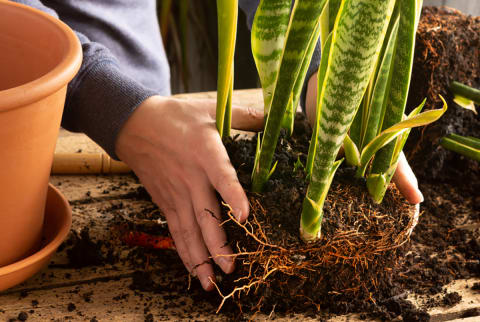Advertisement
5 Natural Plant Fertilizers To Kick Off Growth In Your Garden


Spring has sprung, and for plant parents and gardeners everywhere, that means it's time to amp up the plant care. One easy way to promote growth in your favorite indoor or outdoor plants is, of course, to use fertilizers.
Generally, store-bought fertilizers tend to have the best mix of nutrients, but there are a handful of DIY options that can support your plants through the new season too—and you probably have at least one of them at home already!
Eggshells
Eggshells contain lots of calcium, making them a great addition to your plants' soil. According to Debra Lee Baldwin, author of Succulents Simplified, they can also be crushed on the surface of the soil to keep snails and slugs out of plants. Just be careful, she notes, as albumin (a protein found in egg whites) residue can attract vermin.
To use them as a fertilizer, grind them up in a food processor and add them to your soil, keeping an eye out for pests after application.
Fish or seaweed emulsion
For a powerful but natural addition to your plant care routine, Kierslyn Kujawa, Earth's Ally brand ambassador and plant influencer behind PlantedinPots, recommends using fish or seaweed emulsion. They contain vitamins, minerals, amino acids, naturally occurring growth hormones, and couldn't be easier to use.
You can dilute a tablespoon in a gallon of water and use it to water your plants, or put the solution in a spray bottle and use it for misting the soil and leaves between waterings.
Worm castings
Another favorite of Kujawa's, worm castings are essentially worm waste. They're packed with nutrients your plants will love, and she notes there's less risk to fertilizer burn (aka over-fertilizing) when you use them.
They can also help keep pests away, which is always a win, and can be bought from the store/online (or you can DIY it with worm bins if you want to go that route). When you've got your worm castings, you can lay them on top of the soil or mix them directly into the soil when planting.
Banana peels
Don't throw away your banana peel the next time you finish a banana! Baldwin notes they're famous as food for staghorn ferns—and there are a few ways you can use them.
In this viral TikTok by Armen Adamjan, he shows how soaking a chopped-up banana peel in water for at least an hour creates a nutrient-rich fertilizer you can use to water your plants (think potassium, phosphorous, calcium, and magnesium). You can also add banana peels to your compost pile, of course, which brings us to our next point.
Compost
"Like many gardeners, I have a compost pile that kitchen and green garden waste go into," Baldwin tells mbg, adding, "Red worms turn it into rich, dark soil full of nutrients." (Shoutout, worm castings.) You can use your compost as a mulch for in-ground plants, she explains, or even make compost tea.
To do this, she says, pile some compost into cheesecloth, tie the top, and soak it in a bucket. When the water turns brown, you have "fertilizer tea" you can use to water your plants. And after wringing out the moisture, you can return the tea bag contents to the compost pile!
The takeaway
Plenty of store-bought fertilizers are great for plant growth, but options like eggshells, banana peels, and compost are also worth a shot. Bonus: They'll not only help your plants grow but will use up some kitchen waste, too.